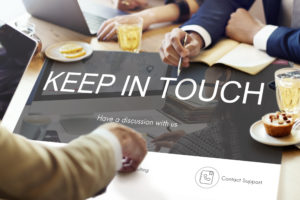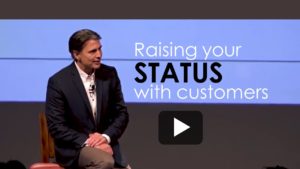Trusted Advisor Customer Service Blog Posts
Written By Jeff Mowatt – (all original content not AI generated)
Written By Jeff Mowatt – (all original content not AI generated)
One Word that Enhances Cooperation by 57%
 Harvard Psychologist, Ellen Langer discovered a surprising way to gain cooperation. In her study, researchers would interrupt someone making photocopies; asking if they could make their copies first. Only 60% of machine users would comply. Next, researchers would interrupt another user, this time adding a phrase beginning with the word, "Because..." Apparently, it didn't matter what came after the word. Even saying, "Because I'm in a hurry," resulted in 95% compliance - a 57% increase! The lesson - anytime you're asking a customer, co-worker, or family member to do something, remember to add, "because..." and you'll gain greater cooperation. Not bad for remembering a single word!
Harvard Psychologist, Ellen Langer discovered a surprising way to gain cooperation. In her study, researchers would interrupt someone making photocopies; asking if they could make their copies first. Only 60% of machine users would comply. Next, researchers would interrupt another user, this time adding a phrase beginning with the word, "Because..." Apparently, it didn't matter what came after the word. Even saying, "Because I'm in a hurry," resulted in 95% compliance - a 57% increase! The lesson - anytime you're asking a customer, co-worker, or family member to do something, remember to add, "because..." and you'll gain greater cooperation. Not bad for remembering a single word!
Four Follow up Tips to Grow your Business
The Sales Manager didn’t hesitate when I asked her, “What’s one thing you think your team members could do more of to enhance their success with customers?” Her immediate response: “Follow-up.” Working with sales and service teams for over 25 years and observing the practices of the most successful team members, I’ve found this to be true. We often get so caught up in responding to customers and prospects, or hunting for new business, we neglect to pro-actively follow-up as thoroughly or consistently as we should. Ironically, following-up is one of the easiest and highest payoff activities we can do to grow our business. Often we don’t follow-up because we’re afraid of hearing a no. Other times we can’t think of a good excuse to stay in touch. Here are 4 tips I share in my seminars that will make follow up easier and more
1. Customers Want Follow-up
Often sales reps are concerned that following-up with a potential customer after the first contact will come across as pushy. Keep in mind that customers responsible for making buying decisions are by definition, busy, successful people. Chances are they have lots on their plate and they may have been inadvertently putting your proposal on the back burner. They may already have you on their to-do list to contact for the next step. So, remember you’re not interrupting customers by following up; you’re being courteous and doing them a favour.
2. Electronic is Easy
If you’ve given the customer a price or proposal, they may have unfortunately opted to go with your competitor. So, they might not be receptive to your phone call because they’re afraid you may not take rejection well. Or that you’ll try to talk them out of their decision. That’s awkward for everyone. That’s why following-up electronically with an email or text will often get you a faster, more honest response. When sending an email, it’s still important to not come across as pushy. So state in your subject line that this is a “Courtesy Follow-up.” It reminds them that you are being conscientious and thorough. That builds trust. In the body of your message don’t just ask whether the person has taken some action or made a decision. That can sound blunt; almost like an accusation. Instead, ask if they’ve had a chance yet to take action. That wording comes across polite and empathetic.
3. Be Better at Losing
If it turns out that the potential customer has indeed gone ahead with another supplier, then epitomize graciousness. In an upbeat tone let them that you’re pleased they are moving forward with their plans. If you know and respect the successful competitor, then mention that you’ve heard good things about that company. Here’s the kicker - finish by stating that if for any reason the other company isn’t able to deliver, or if the customer would like a backup in case of unforeseen issues, then to please keep you in mind. There are lots of reasons why customers choose different suppliers midstream. Being proactive, professional, and positive - even while not receiving the business -positions you at the top of the backup list when they decide to switch suppliers. You have nothing to lose by being gracious and everything to gain.
4. Out of sight - out of mind
Just because you did some business one time with a customer doesn’t necessarily mean they think of you or remember you. In reality, customers are more focused on their own businesses than they are on their suppliers. That’s why it’s so important to stay in contact. Forget the conventional ‘just checking in’ time wasters. Instead, provide them with regular tips that can help them to achieve their goals. You can do this via email, social media, or organizing professional development events for your customers and their team members. Add in some food, call it a lunch and learn, and they will remember you.
Bottom line - Interacting one time with a customer or prospect doesn’t mean you have a relationship. It means you had a transaction. Following-up proactively and regularly helps transform a transaction into a relationship. It proves you remember that person and are organized enough to stay in touch. That builds trust - a critical step towards positioning you as their Trusted Advisor.
How to Build Trust with Skeptics
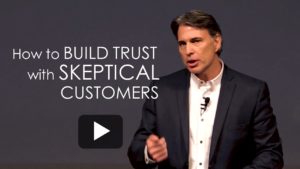 You've probably heard that when you first deal with potential customers, you should share your elevator speech. In reality, I've found most of these verbal teasers of what you offer sound so contrived that they actually reduce trust. They often come across as trying too hard. That's why in this short video I share a different way of earning trust; both with current and potential customers. Feel free to share with your colleagues.
You've probably heard that when you first deal with potential customers, you should share your elevator speech. In reality, I've found most of these verbal teasers of what you offer sound so contrived that they actually reduce trust. They often come across as trying too hard. That's why in this short video I share a different way of earning trust; both with current and potential customers. Feel free to share with your colleagues.
Six Secrets to NOT share with Customers
Oversharing blunders that annoy customers and limit careers
 "I wish some of my team members would think more before they speak.” This was the comment made by a senior HR manager of a construction company where I was brought in to conduct Trusted Advisor training. She continued, “They inadvertently share more than our customers need to hear.” In today’s world of social media where people post their opinions and details of their lives for the entire world to scrutinize, we’re finding oversharing is a growing problem. Not only does it jeopardize customer loyalty; it also limits career advancement. See if you or your team members ever commit any of these top six oversharing blunders.
"I wish some of my team members would think more before they speak.” This was the comment made by a senior HR manager of a construction company where I was brought in to conduct Trusted Advisor training. She continued, “They inadvertently share more than our customers need to hear.” In today’s world of social media where people post their opinions and details of their lives for the entire world to scrutinize, we’re finding oversharing is a growing problem. Not only does it jeopardize customer loyalty; it also limits career advancement. See if you or your team members ever commit any of these top six oversharing blunders.
1. Referring to other customers
Customers like to feel that they are your only customer, especially if they do a lot of business with you. That’s why when you’re busy working on projects or orders for other customers, it’s important to keep that fact to yourself. Explain to the customer the steps you’re taking to keep things on schedule for him or her. Don’t mention other customers or projects that also require your attention.
2. Internal Affairs
Over the course of working with a client on a project, there may be internal issues - staffing shortages, unanticipated obstacles, equipment failures - that arise that affect their project. In general the customer doesn’t need nor want to hear about these problems unless they’ll effect the overall outcome. Even then, more important than hearing about obstacles, what the client really wants to know is your plan get the project back on track.
3. How the customer's needs compare to yours
When customers share details about themselves that you can relate to, there’s a temptation to jump in and share your similar experiences. But that’s not why the customer is there. It’s fine to be able to connect at a personal level, but your personal experiences can come later. In the early stage of the interviewing customers, it’s more important to dig deeper to find out what’s really behind their needs. It’s OK for customers to like you as friend when you have lots in common. But it’s more important for them to value you as their Trusted Advisor. Keep my little rhyme in mind: “Friends compare and overshare. Advisors ask and stay on task.” It’s a reminder to talk less and listen more.
4. TMI
At a hotel where I was hosting a conference, I phoned the main reception and asked to speak with the General Manager. The front desk receptionist tells me, “She’s working-out right now. Can you call back in an hour?” When I called back later the receptionist then explained, “She’s taking a shower now.” I’m not making this up! While that’s an extreme example of oversharing personal information with a customer, more common examples are references to coworkers who are… at lunch, sick today, on a smoke break, on holidays, with another customer (see blunder #1) etc. Best to simply tell the customer that the person is unavailable or out of the office until a certain time or day and offer to take a message.
Speaking of too much personal info, when customers ask how we are, they don’t want to hear lamentations about our physical or mental state or how anxious we are for our shift to be over. Buyers aren’t there to hear whining. It instantly diminishes the customer experience. Just remain positive and focus on helping the customer.
5. Obvious product features
Customers have so much access to information that when it comes to larger buying decisions they’ve often done their homework before contacting you. Explaining features which customers already know and understand sounds condescending. That’s why it’s important to begin that part of the conversation by asking, “How familiar are you with…?” Then as you describe your offerings, focus less on features and more on benefits as they relate to that particular customer.
6. Technical Jargon
In general, the higher-up the chain of command an internal or external customer is, the less interested they are in technical details. They are primarily interested in outcomes. So resist the urge to impress senior managers with how much of a technical expert you are. When an executive asks about the weather, they don’t want to be told how to make a thermometer.
The training solution
While discretion is said to be the better part of valor, I believe it’s also the better part of value - the value that customers and employers place on your service. The sad reality is that many employees aren’t even aware they are committing these blunders. Fortunately, all it takes is a single seminar to sidestep these oversharing errors and enhance customer experience. One thing is certain, unless employees are made aware of how their words can damage goodwill and hurt their own careers, they’ll continue to overshare.
The Biggest Avoidable Risk in Business
 Alain, a manager and sponsor of one of my speaking tours, introduced me by telling the audience about his shopping experience at a business that sold high end technology. He explained how the company had obviously spent millions of dollars on buildings, equipment, inventory, salaries, insurance, and advertising. However, the employee who interacted with him appeared to be having an off day and didn't seem concerned about whether Alain found what he needed. "In other words," Alain continued, "The company invested all that money building a brand to bring customers like me in the door. But one employee not being trained properly, meant all that money was wasted." The lesson is your team members ARE your brand. It only takes one untrained employee to eliminate brand value. Managers who neglect to train their team members on how to build trust, are subjecting the company's resources to substantial unnecessary risk.
Alain, a manager and sponsor of one of my speaking tours, introduced me by telling the audience about his shopping experience at a business that sold high end technology. He explained how the company had obviously spent millions of dollars on buildings, equipment, inventory, salaries, insurance, and advertising. However, the employee who interacted with him appeared to be having an off day and didn't seem concerned about whether Alain found what he needed. "In other words," Alain continued, "The company invested all that money building a brand to bring customers like me in the door. But one employee not being trained properly, meant all that money was wasted." The lesson is your team members ARE your brand. It only takes one untrained employee to eliminate brand value. Managers who neglect to train their team members on how to build trust, are subjecting the company's resources to substantial unnecessary risk.
Change One Word to become less Defensive with Unhappy Customers
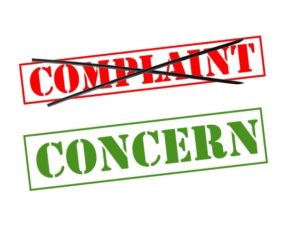 No one likes to hear customers complain. Employees become impatient and defensive when faced with these “trouble-makers.” One of my seminar participants equated listening to customer complaints to undergoing amateur eyeball surgery. (That can’t be good). To prevent this defensive mindset, employees need to be trained to treat customer complaints as concerns. Employees need to know that customers who express concerns are helping you to stay sharp and competitive. Focusing on customer concerns vs complaints will immediately shift a potentially negative situation into one that is positive and productive.
No one likes to hear customers complain. Employees become impatient and defensive when faced with these “trouble-makers.” One of my seminar participants equated listening to customer complaints to undergoing amateur eyeball surgery. (That can’t be good). To prevent this defensive mindset, employees need to be trained to treat customer complaints as concerns. Employees need to know that customers who express concerns are helping you to stay sharp and competitive. Focusing on customer concerns vs complaints will immediately shift a potentially negative situation into one that is positive and productive.
Negotiating with Nay-Sayers : Navigating Resistance
Communication Strategies - Navigating Resistance
It seems these days people are so pressured, so busy, and so over-regulated at work that it’s difficult to get their attention at all; let alone get them to do you a small service. Next time you find yourself dealing with a person who seems to be putting up more barriers than bridges, try this strategy. Before approaching them with your request have a fallback scaled-down plan B ready. If they decline your first request ask, “If you can’t do 'A' then can you at least do 'B'?” Immediately, the other person views you as being somewhat reasonable – after all you’ve ‘given-up’ is your plan 'A'. So, in the spirit of fairness the other person subconsciously feels that they need to give a little as well.
Be Discreet about Seeing Other Customers
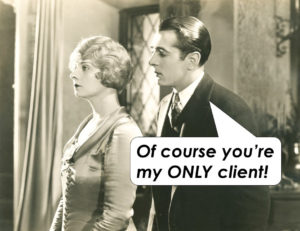 Imagine you're a customer asking a supplier about the status of a project that's delayed. The rep apologizes and explains that not only are they short staffed this week, but business is swamped with other customers who have rush projects. Unfortunately, that explanation gives the impression you are being slighted in favour of more important clients. Customers like to believe they're your only customer, even though they know it isn't true. That's why, despite how carelessly open we've become about revealing details of lives and our opinions on social media, it's important that - with customers at least - we use discretion. While it's Ok to mention that a few coworkers are off sick, we shouldn't bring up our other projects or customers. It's oversharing and it only makes customers wish they'd been dealing with a supplier who valued their business enough to make them more of a priority.
Imagine you're a customer asking a supplier about the status of a project that's delayed. The rep apologizes and explains that not only are they short staffed this week, but business is swamped with other customers who have rush projects. Unfortunately, that explanation gives the impression you are being slighted in favour of more important clients. Customers like to believe they're your only customer, even though they know it isn't true. That's why, despite how carelessly open we've become about revealing details of lives and our opinions on social media, it's important that - with customers at least - we use discretion. While it's Ok to mention that a few coworkers are off sick, we shouldn't bring up our other projects or customers. It's oversharing and it only makes customers wish they'd been dealing with a supplier who valued their business enough to make them more of a priority.


